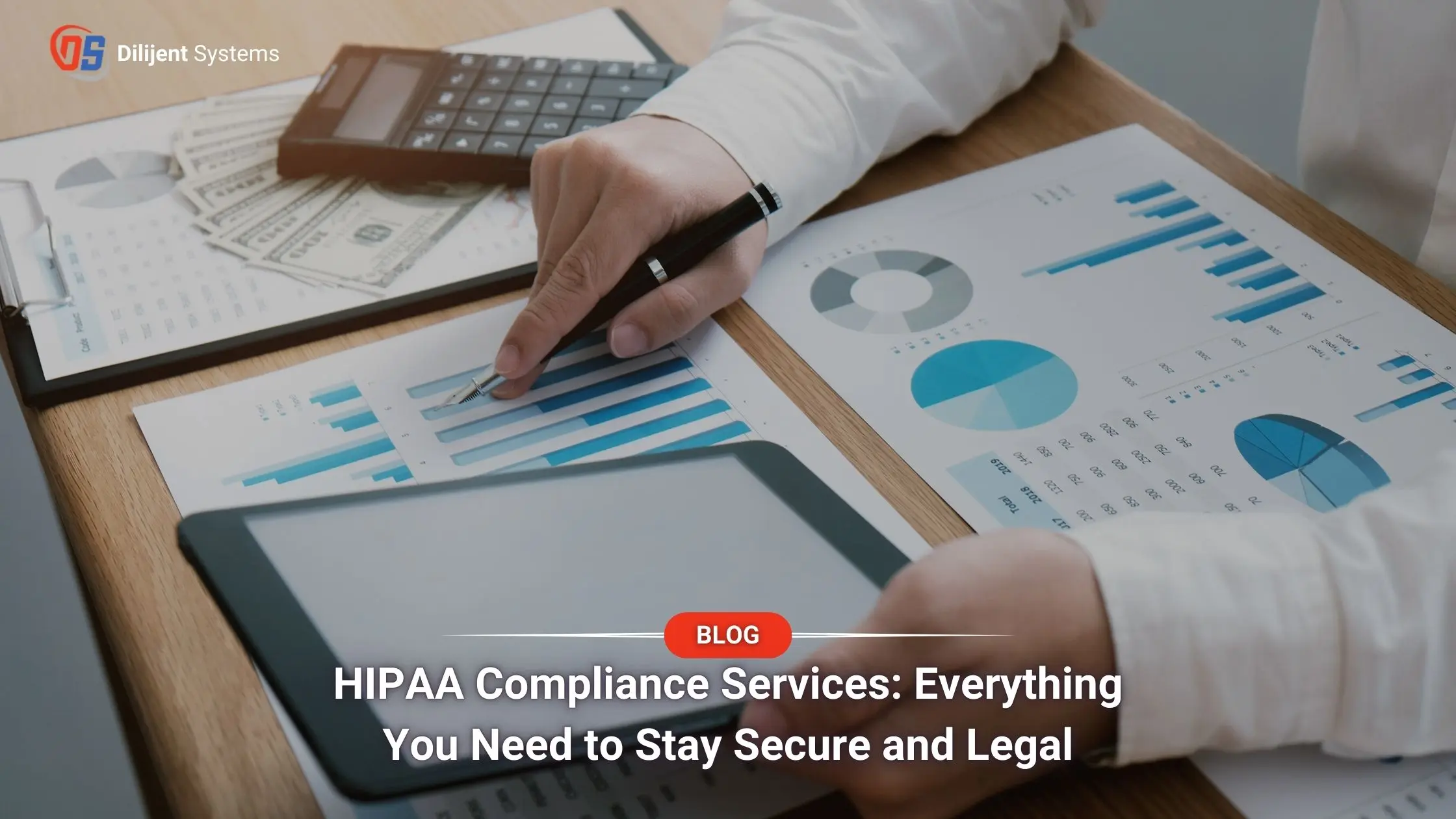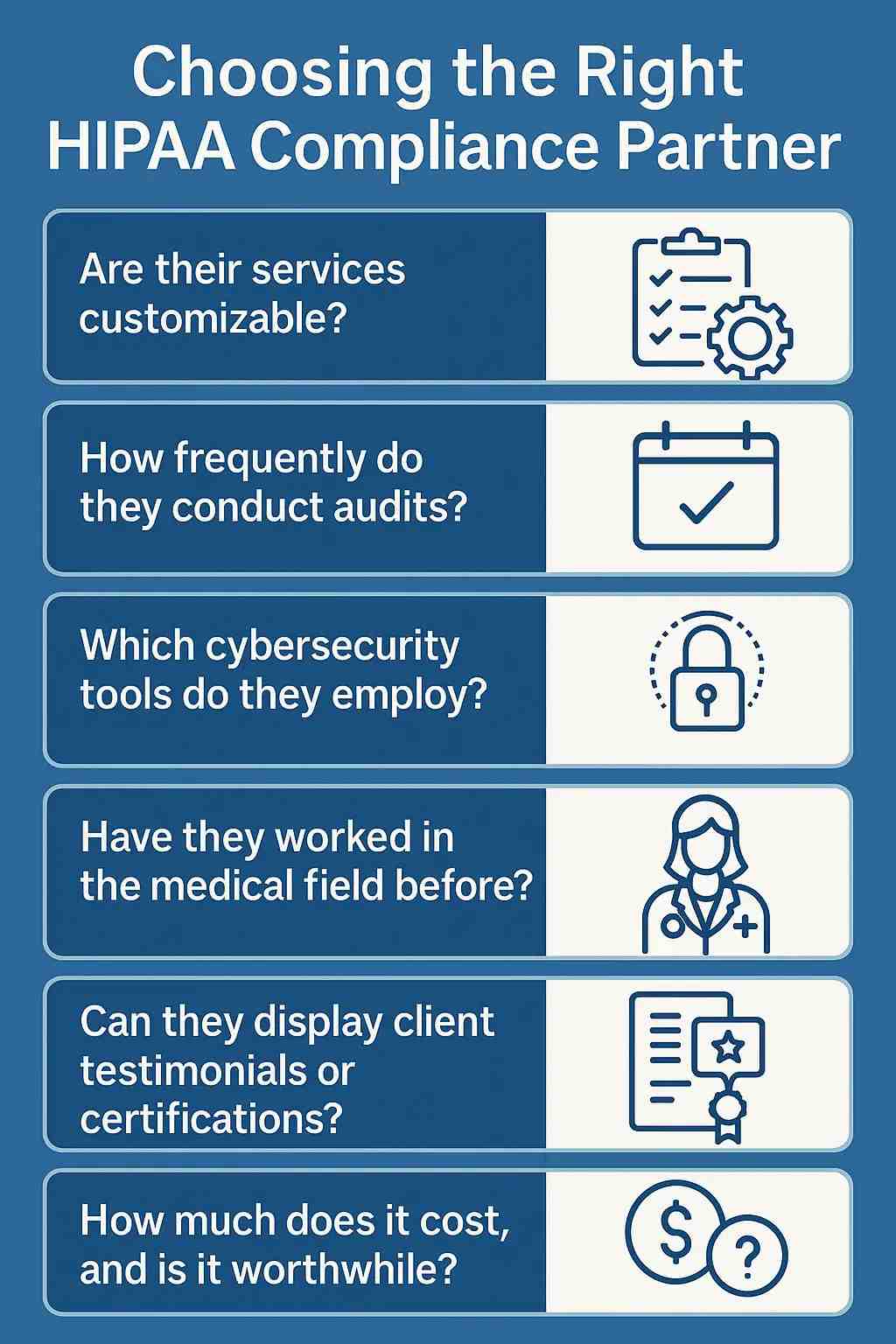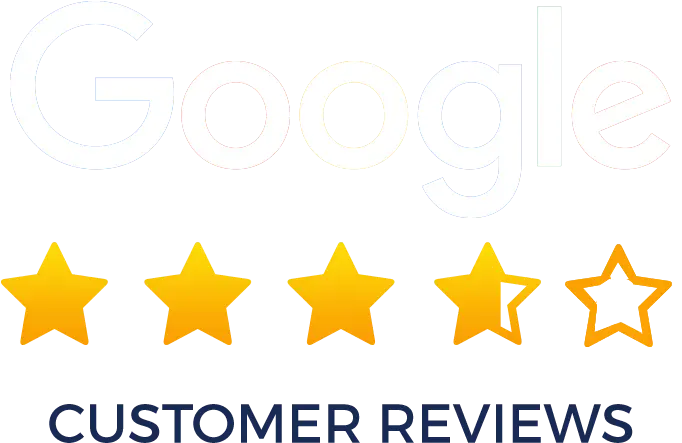
If you work in healthcare and handle all the patient data, you must have heard of HIPPA.
HIPPA is a set of rules that are designed to safeguard patient data at any healthcare center.
If you want to make your healthcare center completely legal and secure, you need to follow these rules.
However, the problem is that these rules are ever-changing and you cannot keep track of all. You will need to hire professional staff who will take care of all these rules.
If you fail to comply with any of the HIPPA rules, your business will have to face severe consequences.
Get out of this hustle and choose the best HIPPA compliance services for your healthcare center. This means that you are waiting for a third party to take care of all these rules and regulations for you so that your healthcare business doesn’t have to face any problems.
Diligent Systems is one of the best medical billing and coding companies in the USA. We take care of all the revenue cycle optimization processes. We also provide great HIPPA compliance services that will help your business to comply with HIPAA rules.
This blog is going to give you a detailed introduction to HIPPA rules and regulations. We will also tell you about the best HIPPA compliance services in the USA. Let’s get started!
What is HIPPA?
HIPPA is a US law that regulates patient data safety in various healthcare centers. These are the set of rules that explain the main security requirements for any patient’s data and also clarify who can access the data. This way the patient’s data and records are kept safe and sound.
If your organization fails in complying with these HIPPA rules, you will have to face sever charges. Even your business can be charged for fraud.
If you want to save your business from any potential risks, you need to understand the basics about HIPPA compliance and and also find a perfect HIPPA compliance service providers for your business.
HIPPA rules are very important because they protect critical patient information like contact information, medical reports, test results, and health insurance details.
Who Needs to Be HIPAA Compliant?
Then comes the questions, who is subjected to follow these laws?
The answer is very simple. Anyone who handles Protected Health Information (HPI) should follow these laws. Here are some main businesses or organizations that should follow these rules:
-
Healthcare Providers: Doctors, nurses, clinics, hospitals
-
Health Plans: Insurance companies, HMOs
-
Healthcare Clearinghouses: Companies that process health data
-
Business Associates: Vendors that work with any of the above (such as billing companies or IT service providers)
Challenges in Staying HIPAA Compliant
Maintaining HIPAA compliance isn't always simple. The fact that laws and regulations are constantly changing is one major obstacle. Healthcare professionals may find it challenging to stay on top of all the changes.
Managing patient data, or PHI, is another problem. It can be challenging and time-consuming to store, share, and protect this data in the precise ways that are required.
Additionally, many healthcare practices lack the resources and expertise necessary to manage compliance independently. This makes it simple to overlook crucial steps.
Errors made internally can also lead to issues. Data breaches may result from employees' negligent mistakes or lack of training.
Finally, there are external dangers such as ransomware, phishing, and hackers. These online dangers are constantly changing and have the potential to compromise sensitive
What Are HIPAA Compliance Services?
HIPPA compliance services are companies or tools that help your business follow HIPPA rules. These companies have special tasks that ensure that your business is in accordance with the HIPPA laws.
These companies run security check on your data and records to ensure that no rule was violated. These companies also train your staff and help them learn the HIPPA laws so that te implementation could become easy.
They also manage data encryption and backups to prevent any hackers. At the last, these companies give suggestions and advice to the staff.
In short, these companies help in every way to make sure that your healthcare business is following the HIPPA rules.
Benefits of Using HIPAA Compliance Services
Your healthcare company can feel secure and protected by using HIPAA compliance services.
They first assist you in avoiding legal issues. These services walk you through each step of the process and keep up with the most recent HIPAA regulations. This lessens the possibility that errors or omitted information will result in a fine or legal action.
Second, the security of your patient data improves. To safeguard sensitive data, these services make use of robust security measures like access controls, secure servers, and encryption. This lessens the likelihood of data leaks, hackers, and other online dangers.
When patients are confident that their private health information is in good hands, they are more likely to trust you. This trust enhances your reputation in the medical community and creates enduring relationships.
You can also save time and money by using a HIPAA service. You don't have to hire a big staff or invest months in creating a comprehensive compliance plan. They provide resources, professionals, and experience in one location.
Finally, these services can expand along with your company. They can modify their services to meet your evolving needs as you grow, regardless of how big or small your hospital is.
Choosing the Right HIPAA Compliance Partner

A major step in maintaining the security and legality of your healthcare business is selecting the appropriate HIPAA compliance partner. What to look for is as follows:
Are their services customizable?
Every healthcare setting is unique; a large hospital won't use the same setup as a small dental office. A good HIPAA partner should provide flexible services and be aware of your unique needs. Their solutions ought to be customized to your practice's size, nature, and patient data management procedures.
How frequently do they conduct audits?
You can stay on course with regular compliance audits. Find out how frequently the provider checks your systems for problems. Regular audits indicate that they are actively searching for security flaws and assisting you in addressing them before further harm is done.
Which cybersecurity tools do they employ?
Modern tools to combat online threats should be provided by a strong HIPAA partner. These consist of employee access controls, multi-factor authentication, firewalls, and safe backups. Effective tools aid in defending your systems against viruses, ransomware, and data theft attempts by hackers.
Have they worked in the medical field before?
HIPAA is complicated and unique to the medical field. There will be fewer errors if you work with someone who has actual experience in the medical industry. They will be fully aware of the requirements for a safe and compliant practice.
Can they display client testimonials or certifications?
Request evidence of their abilities and accomplishments. Check for endorsements from physicians, clinics, or hospitals, as well as certifications such as HITRUST. Reviews can tell you how responsive, dependable, and helpful they are.
How much does it cost, and is it worthwhile?
Although price is important, don't base your decision solely on the lowest price. Compare the quality of support, response time, and services offered. Better protection and fewer issues down the road are frequently associated with slightly higher prices.
Common Myths About HIPAA Compliance
A common misconception is that you only need to comply with HIPAA once. It's actually a continuous process. Your systems need to be reviewed and updated on a regular basis because regulations can change and new threats can arise.
The idea that HIPAA-compliant software is sufficient is another prevalent misconception. Software is crucial, but complete compliance is not guaranteed by it. To keep patient data really safe, you also need robust policies, employee training, and frequent risk assessments.
Some people think that HIPAA services are only necessary for large hospitals. However, anyone who handles protected health information (PHI) is subject to HIPAA, including solo practitioners, small clinics, and therapists.
Finally, a lot of people believe the IT staff can manage everything. Although IT plays a significant role, HIPAA also entails administrative and legal duties. All members of the organization must
Why Dilijent Systems Is Your HIPAA Compliance Partner
For healthcare organizations looking for all-inclusive HIPAA compliance solutions, Dilijent Systems is the perfect partner. They provide specialized services that are in line with each client's unique requirements, guaranteeing that every facet of HIPAA regulations is fully covered.
Their team of professionals keeps abreast of the most recent compliance standards and best practices, giving clients the assurance that their operations adhere to all applicable laws.
Dilijent Systems offers comprehensive training programs in addition to compliance strategies to inform employees at all levels of their responsibilities for upholding compliance. To safeguard sensitive data, they use cutting-edge security measures like data encryption and secure access controls.
Their continuous monitoring and support services guarantee that businesses stay in compliance over time, adjusting to any modifications to laws or organizational frameworks.
Dilijent Systems is a trustworthy and informed partner in HIPAA compliance, offering scalable solutions that expand with your company, regardless of the size of your hospital network or clinic.
Summary
In the modern healthcare setting, safeguarding patient data is not only required by law but also a duty. For businesses of all sizes, HIPAA compliance services make this process simpler, safer, and more dependable. The advantages are obvious, ranging from lowering legal risks to enhancing data security and gaining patient trust.
You can make sure that your personnel, policies, and systems all adhere to HIPAA regulations by working with a compliance partner like Dilijent Systems. They are the ideal partner for your compliance journey because of their customized solutions, knowledgeable advice, and continuous support. Maintain patient care as your compliance is managed with tact and assurance.
FAQS
What is needed for HIPAA compliance?
In order to comply with HIPAA, patient health information (PHI) must be protected using administrative, technical, and physical safeguards. It also entails appropriate policy documentation, frequent risk assessments, and employee training.
How do you stay in compliance with HIPAA?
Maintain compliance through frequent security practice updates, employee training, risk assessments, and quick resolution of any security flaws or data breaches.
What is the security rule in HIPAA compliance?
The HIPAA Security Rule establishes guidelines for safeguarding electronic PHI (ePHI), mandating that covered organizations employ secure systems, manage access, and put audit controls and encryption in place.


